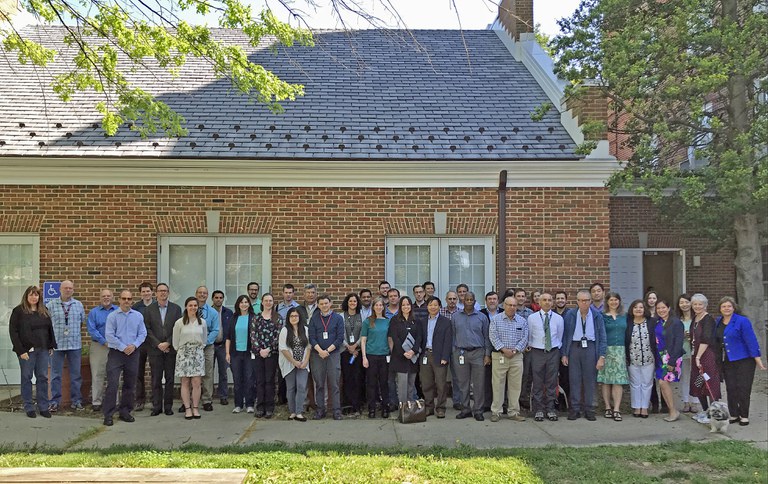Posted: June 13, 2018
Faculty and graduate students from the Department of Plant Pathology and Environmental Microbiology (PPEM) at Penn State presented a seminar focused on the taxonomy of plant pathogens, hosted by the Department of Agriculture (USDA) Animal and Plant Health Inspection Service (APHIS), Plant Protection Quarantine (PPQ) and Agriculture Research Service (ARS) on May 9.

Attendees at the Taxonomy of Bacteria and Fungi seminar in Beltsville, Md on May 9, 2018. (Image: Gloria Abad/APHIS)
BELTSVILLE, Md. - Faculty and graduate students from the Department of Plant Pathology and Environmental Microbiology (PPEM) at Penn State presented a seminar focused on the taxonomy of plant pathogens, hosted by the Department of Agriculture (USDA) Animal and Plant Health Inspection Service (APHIS), Plant Protection Quarantine (PPQ) and Agriculture Research Service (ARS) on May 9. The event was organized by Dr. Jorge Abad, Senior Plant Pathologist USDA-APHIS-PPQ-PHP-PCC, and Dr. Jo Anne Crouch, Acting National Program Leader - Plant Health USDA-ARS.
Event attendance totaled 55 people, which included members from USDA-APHIS-PPQ, ARS, the Center of Plant Health Science and Technology Beltsville (CPHST-BL), Plants for Planting (PPP), National Identification Service (NIS), the University of Maryland and The Pennsylvania State University. Representing Penn State were faculty members Dr. Carolee Bull, PPEM department head and director of the Penn State Microbiome Center, Dr. David Geiser, PPEM professor and director of the Fusarium Research Center, and graduate students Amanda Mainello and Terry Torres-Cruz. Mainello and Torres-Cruz presented sections of their advisers' presentations "The Trouble with Fungal Taxonomy: Bacterial Style" (Bull) and "Fungal Taxonomy: Naming Your Friends and Enemies" (Geiser).
Dr. Gloria Abad, USDA-APHIS scientist and Penn State adjunct professor, organized an afternoon visit for the Penn State delegation to the USDA-APHIS-PPQ facilities located at building 580. They had the opportunity to learn about the missions of the Inspection Station (managed by Paul Ijams), the Plant Germplasm Quarantine Program (directed by Dr. Joe Foster), and the Center of Plant Health Science and Technology (directed by Dr. Mark Nakhla). The program concluded with a meeting, which included visitors and members of CPHST and PGQP, to discuss aspects of common interest including future collaboration between Penn State and the USDA.
Presentations emphasized important aspects of nomenclature, systematics and the correct identification at the species level and beyond in fungi and bacteria. "Pest permitting needs precise information in these aspects to advance in the decision making during the permitting process at a time where applications for PPQ P-526 permits have increased significantly," Dr. Abad said. "The organizers and participants were very pleased with the APHIS/ARS joined seminar, suggesting future collaboration in arranging similar events to facilitate the communications and collaboration among scientists from sister agencies and other institutions."
 |  |
|---|---|
| Center for Plant Health Science and Technology Beltsville director Dr. Mark Nakhla, right, explains the laboratory role in methods development for the diagnostics of plant pathogens of biosecurity concern. Image: Gloria Abad/APHIS | Center for Plant Health Science and Technology Beltsville research molecular biologist, Dr. Michael Stulberg, left, demonstrates second-generation sequencing (next-generation sequencing) using Illumina MiSeq equipment. Image: Gloria Abad/APHIS |

